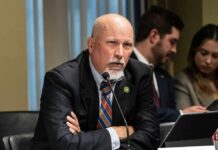
In a display of inadvertent self-analysis, Sen. John Fetterman (D-PA) found himself center stage this week, albeit awkwardly, under the unforgiving lights of public opinion. During a Wednesday evening appearance on “The Late Show with Stephen Colbert,” Fetterman, notably garbed in his signature shorts and hoodie, candidly expressed a dim view of the collective intellect being sent to Congress, stating that the nation is “not sending their best and brightest.” The irony of this statement, coming from a man who projects anything but a traditional image of a polished politician, has not gone unnoticed by the public and pundits alike.
The casualness, both in dress and in his disposition toward the earnestness of governance, seems to underscore Fetterman’s unexpected arrival in the political arena. In a conversation with Colbert that meandered from topics as serious as government shutdowns to the more light-hearted, like his notorious disregard for Senate dress norms, Fetterman, perhaps unwittingly, created a spectacle ripe for dissection by conservative commentators.
Fetterman speaks truth. He's unaware of it, but he embodies the very truth he speaks. This could have been a skit on SNL. But it was a rare funny moment on Colbert. https://t.co/zcHmYbGqLT
— Gov. Mike Huckabee (@GovMikeHuckabee) October 12, 2023
“Fetterman speaks truth. He’s unaware of it, but he embodies the truth he speaks,” opined former Arkansas Gov. Mike Huckabee (R) on the X platform, formerly Twitter. Many others voiced similar sentiments, pointing to a perceived lack of self-awareness on the senator’s part. Conservative commentator and media producer Alex Lorusso quipped, “Just wait until John Fetterman hears about John Fetterman.” Meanwhile, former Sen. Ted Cruz (R-TX) staffer Steve Guest added fuel to the fire with a brief “Pot met kettle.”
The senator’s remarks resonate with a kind of irony many find hard to overlook, especially given his personal and professional journey. Conservative columnist and author Joe Concha recalled: “Yes. Fetterman — the guy who lived off of his parents into his 40s and has never held a job in the real world in his life — actually said that.” Fetterman’s laid-back approach to public life seems almost to underscore his point about the caliber of individuals steering the ship of state, albeit perhaps not in the way he intended.
John Fetterman on Colbert: "America is not sending their best and brightest, you know, to Washington, D.C."
Pot, meet kettle. pic.twitter.com/MiZEgcMyya
— CJ Pearson (@thecjpearson) October 12, 2023
Yet, it’s not solely Fetterman’s attire or casual demeanor that has drawn ire and skepticism. The senator’s governance and decision-making have not been immune to criticism. Notably, his interaction with fellow lawmakers and involvement in critical legislative decisions, such as narrowly avoiding a government shutdown, has exposed what some might describe as a dangerous naivety toward the gravity of governance. His expressed astonishment at the ease with which the government could have been derailed, displayed during the Colbert interview, may signal a disconnect between his role and his understanding of it.
The controversial comments and subsequent social media frenzy also cast a spotlight on Fetterman’s commendable transparency regarding his struggles with mental health. His candid admission of these struggles and encouragement for others to seek help have seemingly been overshadowed by the senator’s more politically charged and eyebrow-raising soundbites. Fetterman, who recently took a leave of absence for depression treatment and has battled auditory processing issues since a stroke last year, has candidly used his platform to advocate for mental health awareness.
In an age where the image and expectations of political figures are increasingly under the microscope, Fetterman’s off-the-cuff, seemingly oblivious commentary gives a fresh canvas for discussions about sincerity and aptitude in leadership. However, does Fetterman’s path to the Senate not directly counter his lament about the intellectual and moral fiber of those populating Congress?



























